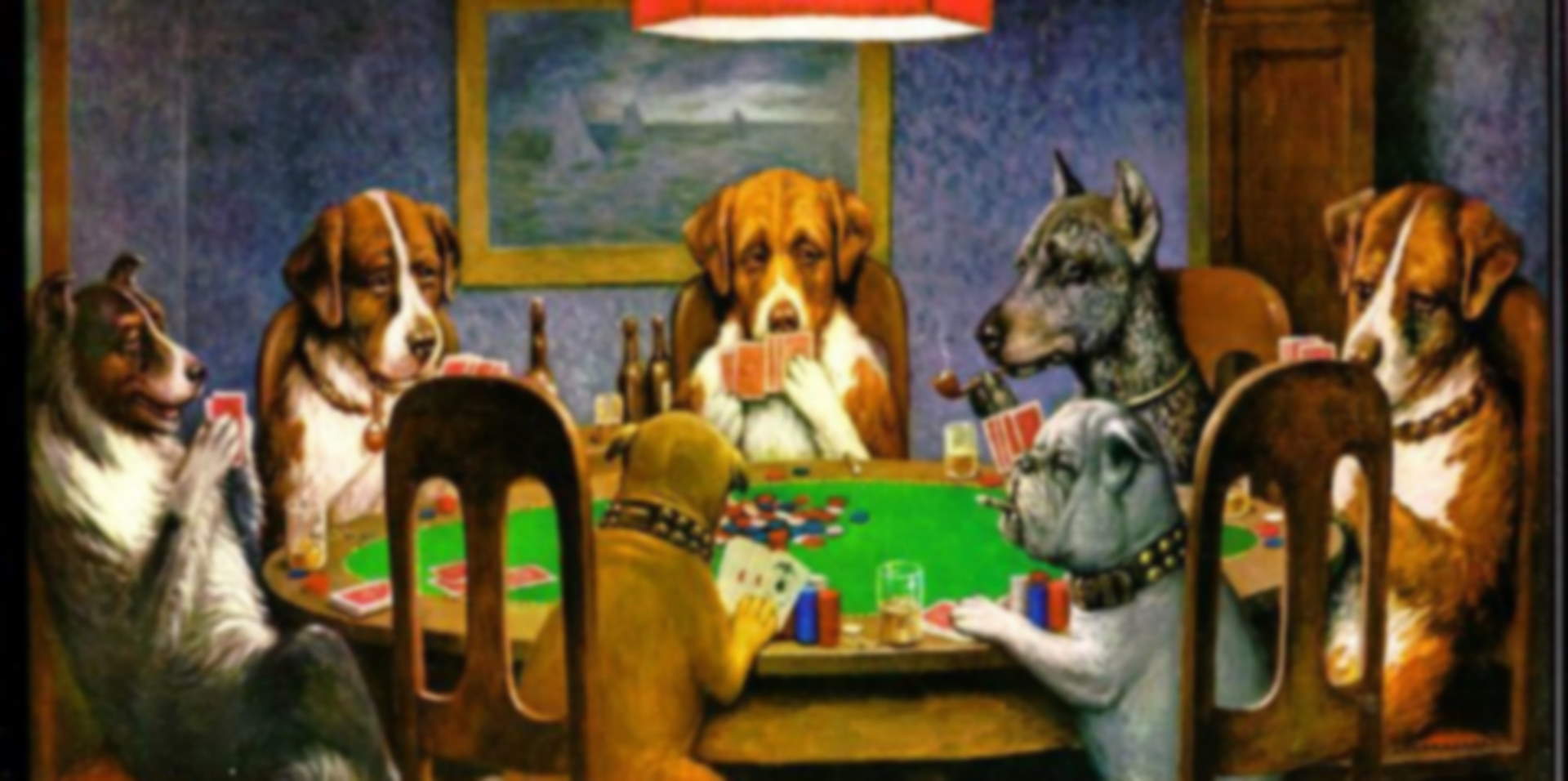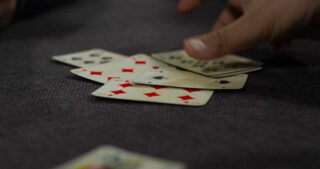/ 
Las Vegas, NV – Standing on the upper row of the aluminum rafters looking down upon the expansive poker combat zone that is the 2006 World Series of Poker is normally not a very good vantage point. But at 7:38 pm on Sunday, July 2, 2006 – it very well might have been the best seat in the house.
Russ “Dutch” Boyd had just won $475,712 and his first WSOP gold bracelet in the short-handed hold’em world championship. Bent off to the side with his head bowed in bitter disappointment was the reigning world poker champion—Joe Hachem. It was a snapshot that said everything one needs to know about the inestimable difference between winning and losing. Boyd’s “crew” screaming in ear-piercing joy, jumping wildly up and down, and finally lifting the 25-year-old wunderkind up in the air as though he had just hit the game-winning homer in the bottom of the ninth. In the meantime, emotionally-wrecked Hachem was curled over in stoned silence with eyes shut, his wife Jeanie’s arm wrapped around her champion. Greg Raymer, the 2004 WSOP champion and Hachem’s pal, was there for comfort and support.
The final hand was as amazing as it was shocking. After fighting off 1,066 challengers over three long days and nights, the heads-up duel between Boyd and Hachem lasted for two full hours. Just when it looked like Hachem might seize the chip lead, Boyd would suppress his rival’s challenge, each time leading more and more credence to the notion that – love him or hate him – Dutch Boyd is a very, very talented poker player.
Hachem pumped his fist in the air when he first saw the hole cards on what would turn out to be the final hand of the largest short-handed poker tournament in history. The trap he had set for hours hoping to entrap Boyd snapped shut, and Boyd was the wounded animal. Replicating the valor and persistence that rocketed Hachem to the forefront of the poker universe nearly a year to the day when he won the 2005 World Series of Poker, Hachem showed ace-queen to Boyd’s ace-five. Hachem’s hand was a huge favorite. If the ace-queen held up and won, Hachem would suddenly enjoy his largest chip lead of the tournament. If he lost, it would all be over. So far, if Hachem was writing a script to win a poker tournament, this is the one he would write.
There has probably never been a larger gallery watching the final moments of a live poker tournament than this one. Packed ten deep around the stands already filled to capacity, everyone was standing - all eyes in the Rio’s 209-table poker room fixed on ESPN’s giant television monitors. They all gazed upward as the flop came A-K-9 of mixed suits. Hachem’s grin turned into a smile. Boyd’s anxiety turned into distress. A jack on the turn did not help either player, and it all came down to a single card. One card was the difference between a quarter-million in extra prize money, and (certainly more meaningful to these two player) a gold bracelet. Boyd desperately needed a five. When the overhead lights glared off the white face of what would be an earth-shattering 3 by 5 inch two-seat voucher of ecstasy and agony, Hachem knew immediately that he was in trouble. It was a low card, but not too low. It was a middle card with an undetermined number of pixels. Then, as the card was tabled, everything suddenly came into focus. It was – depending on who you were cheering for, a fabulous, agonizing, beautiful, ugly, breathtaking, painful - five.
Indeed, poker tournaments can be exhilarating and excruciating things.
The final table started hours earlier with six players:
| Name | Chip Count | Seat | # |
| Pete Hassett | $148,000 | 1 | |
| Dutch Boyd | $909,000 | 2 | |
| David Solomon | $93,000 | 3 | |
| Joeseph Hachem | $287,000 | 4 | |
| Michael Goodman | $575,000 | 5 | |
| Jeff Knight | $62,000 | 6 |
David Solomon was the first player out. The yoga instructor from Austin, Texas got short-stacked and moved-in with his last 25,000 in chips holding king-six. He lost to Mike Goodman’s king-queen suited. Solomon’s poker wisdom earned him $68,227.
Next, Pete Hassett went out with king-queen against Joe Hachem’s ace-jack. Hachem caught an ace, good for a pair, and Hassett went bust. Peter Hassett, a video game tester from Chicago was unplugged from the final table but did receive $91,917 in prize money.
Mike Goodman was eliminated as the fourth-place finisher. The New York City-based poker player who recently graduated from college was making his first-ever WSOP final table appearance. Goodman arrived at the final table second in the chip count, and ended up falling down a few spots to fourth place, which paid $115,607.
Jeff Knight said “goodnight” a short time later when he was caught bluffing on his final hand and was bankrupted by Dutch Boyd. Knight, a professional gambler (non-poker) from Las Vegas, cashed for $153,511.
That left the blood-match that many, if not most, had been anticipating. In so many ways, this was a complete contrast of style and character. Dutch Boyd – brazen, bold, and some would say “brilliant.” Joe Hachem – gracious, gallant, and good-natured.
There were several notable hands during the final confrontation. But none was more momentous as – the hand with the five.
“You walk into this room, you look around, and everybody is so good,” Dutch Boyd said in a post-tournament interview with ESPN’s Norman Chad. “I have been coming here for four years, and three years I have played in it. This room is so full of great players that I really never knew if I would be able to get one of these (gold bracelets).”
“It’s not like they give these away. I look at the names of players who have won a gold bracelet, players like Doyle (Brunson), T.J. (Cloutier), and Joe (Hachem)….and it’s just amazing to be sitting here. It’s an incredible feeling.”
Back atop of the rafters taking it in and watching it all end—the picture was perfectly clear. Boyd continued his interview perched in front of bundles of tightly bound hundred-dollar bills, his right tattooed wrist glimmering in wrapped gold from the battle fought and won. There were photographs taken. There were more interviews. There was loud celebration.
On the horizon, just over the massive crowd swarming around the latest WSOP winner, the reigning world poker champion from Australia shuffled away slowly in dead silence, consoled by his wife – most certainly the only person on earth who could share and empathize with the pain of the moment. Hachem tottered passed the scattered tables and players of an ongoing tournament over in the next section looking for an exit. Slowly, they began to stand. They began to clap. They began to cheer. They knew a champion when they saw one.
Dieser Artikel erschien auf PokerOlymp am 19.04.2007.


